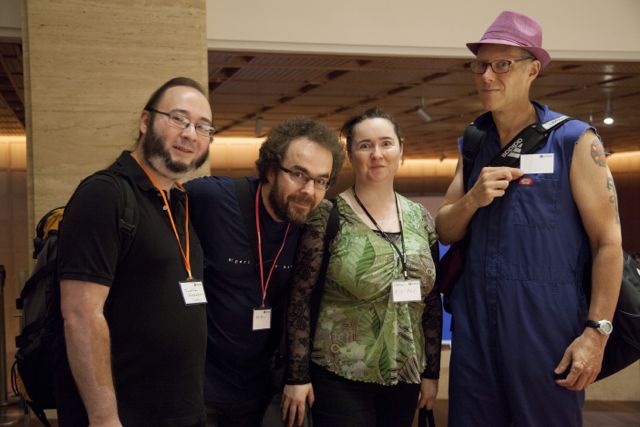Last week I went to YAPC::Asia in Tokyo. One of the many good things about this conference is the amount of blogging that happens around it, but I have been finding it difficult to think of anything to write. This was the seventh YAPC::Asia that I have attended and the conferences have been incredibly consistent. Having a core group of people who are involved in the conference every year does mean that some things just work. The registration is efficient, the signs are wonderful, and the talk schedule runs like clockwork.
There were a number of things that I really liked. This conference, like the other YAPC conferences, is very cheap to attend. My “two day pass with t-shirt” cost me 5,000 円 (40 GBP, 64 USD). But it was also possible to become an individual sponsor of the conference by buying a ticket that started at 10,000 円 (79 GBP, 127 USD). I think that this is a great way to show support and help with the conference costs. These sponsors also received a special t-shirt and a conference mug.

YAPC::Asia Individual Sponsor T-shirt
The registration process was so well organised that having another category of people registering didn’t cause any problems. Making everything look so easy has to be a combination of the experience of the organisers and also the fact that there were 43 people helping out with this conference. I know that when I was involved in running a European conference that we maybe had 10 people volunteering during the event. Mind you, this YAPC in Asia was a much bigger event with 798 attendees.
There was also a professional photographer at the event. This means that there are now good quality photographs of all the speakers and of the general conference that are nice to have but can also be used in the creation of promotional material or to show future sponsors.

YAPC Day 1 - On Arrival at the Venue
It’s not the photographers fault that I was pulling silly faces early in the morning.
I do like that there are prizes for the top three talks. I believe this year that the third prize was a set of books, the second prize was funding to attend three local Perl Monger events in Japan, and the first prize was funding to travel to either YAPC::NA or YAPC::EU. The attendees of the conference use a web-based system to pick the best talks.
It was also the first time that I have seen a Lightning Talkathon. My Japanese language skills are not good enough for me to have quite worked it out on my own. I could see that a group of people were giving lightning talks but my first thought was that it was an area that allowed people to practice their talks before giving these before the entire conference. It turned out to be a mini-conference running inside the main one where all the talks were lightning talks. It was not as well attended as the main sessions but there were still a fair number of people involved and it is certainly an interesting concept.
Larry Wall was the opening keynote speaker, so I’ll finish with a quote from his talk:
There are many computer languages in the the world and they all they think they are perfect. With Perl 6 we are not trying to make it perfect, but right next to perfect, so the next generation can make it perfect.

Larry Wall, Day 2







October 31st, 2012 at 1:58 am
I use Anki to drill my vocabulary lists … it really works well. Just enter a card for each word (with english meanings on the “back” or whatever helps you remember).
The key is to make and use your own cards, not someone else’s deck.
http://ankisrs.net/
October 31st, 2012 at 6:01 am
I should do that. I did try to use anki before but it was with a pre-made deck and I did not feel like it was that useful.
And since I’m typing up the words every day anyway anki may be a more useful place to put them than in a google doc.